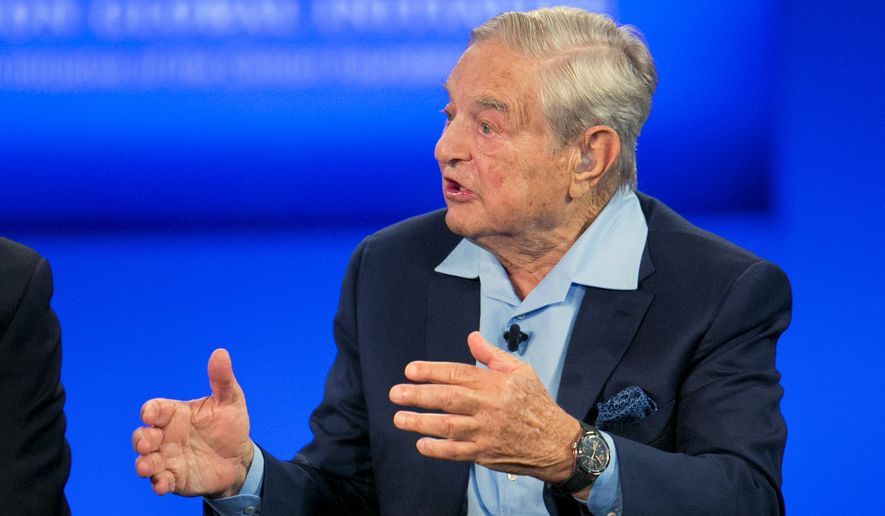George Soros-funded groups targeted in Russian NGO
Post# of 65629


Two pro-democracy foundations launched by liberal U.S. billionaire businessman George Soros have been officially banned by the Russian government, the Kremlin said Monday, which charged that the groups pose a threat to Russian national security and public order.
The decision by the Russian Prosecutor General’s Office, which extends a crackdown on foreign nongovernmental organizations such as the National Endowment for Democracy and Freedom House begun this summer, puts the Moscow branches of Mr. Soros‘ Open Society Foundations and an allied foundation on a so-called “stop list” of foreign NGOs that are no longer allowed to operate within Russia’s borders or give money to Russian individuals and civil society organizations.
“It was found out that the activity of the Open Society Foundations and the Open Society Institute Assistance Foundation poses a threat to the foundations of the Russian constitutional system and security of the state,” said Marina Gridneva, the spokesperson of the Russian Prosecutor General’s Office, in a statement Monday.
The move is likely to increase the tensions between Moscow and Washington, as human rights groups sharpen their criticism of Russian President Vladimir Putin’s record of suppressing opposition groups and public criticism of the Kremlin.
The Hungarian-born Mr. Soros, who made billions as a successful hedge fund trader, has long been a figure of controversy in the U.S., lavishly funding pet liberal causes and candidates over the past decade. But he has also used much of his fortune to bankroll causes and organizations around the world, from anti-apartheid groups in South Africa to microloan bankers in Pakistan to a string of pro-market and pro-democracy organizations in Russia and Eastern Europe for countries emerging from the grip of communism.
Since its founding in 1993, the Open Society Foundations has spent nearly $12 billion, including $1.6 billion on democratic development in Eastern Europe and in former Soviet countries. The Soros Foundations, which operates in some 30 countries, has been closed in Russia since 2003, but had been allowed to continue to supply grants to civil society groups.
We are dismayed by the decision of Russia’s Prosecutor General’s Office today to classify the Open Society Foundations as an ‘undesirable’ organization,” OSF said in a statement Monday, citing the work the organization has done since 1987, including funding education and providing Internet centers in 33 universities in Russia.
Added Mr. Soros himself: “We are confident that this move is a temporary aberration. The aspirations of the Russian people for a better future cannot be suppressed and will ultimately succeed.”
Open Society’s work in Russia has included financing Internet centers in nearly three dozen universities, grants for Russian scholars to travel and study abroad and the development of a curriculum for early childhood education, according to the foundation.
The future of Mr. Soros‘ Russian operations has been up in the air since July, when lawmakers in the Federation Council, the upper chamber of Russia’s parliament, overwhelmingly voted in favor of a “patriotic stop-list” targeting foreign-funded organizations said to pose a threat to the Russian way of life.
The two Soros groups were among a dozen foreign NGOs cited in the crackdown, a list that included the democracy-promoting arms of the U.S. Republican and Democratic parties, the MacArthur Foundation and NGOs based in Ukraine and Poland. Once a group is deemed “undesirable,” its assets are frozen, its offices shuttered, and distribution of its literature is forbidden.
Supporters of the move said it was necessary to prevent foreign money from being funneled into the country to distort the political process. But critics charge the move was in line with Mr. Putin’s campaign to curb free speech and civil liberties as power is increasingly centered in the Kremlin.
In accordance with a law signed in May by Mr. Putin, foreign and international groups deemed to be “undesirable” or “threatening to the basic constitutional order of the Russian Federation, its defense capability or its state security” can be banned from conducting business in Russia.
In addition, anyone who continues to work with the outlawed organizations is subject to fines and even imprisonment.
Following Monday’s decision, the New York City-based OSF is officially forbidden from holding public events and distributing promotional material to the media, and individuals caught circumventing that ban can be sentenced to up to 6 years in prison.
Lyudmila Alekseyeva, a human rights activist and head of the Moscow Helsinki Group, told the Russia Beyond the Headlines website that she thought banning Mr. Soros‘ group was an unfair decision on the part of the Kremlin.
“Soros has done a lot of good to our country. He has not only financed independent public organizations, but also given a lot of money to universities and libraries. In the difficult 1990s, when there was no money for anything, he founded pensions for scientists. He financed scientific institutes.”
The move comes just over a week after Russia’s Justice Ministry listed one of the last prominent media watchdog organizations in the country, the Moscow-based Glasnost Defense Foundation, as a “foreign agent” under a 2012 law requiring NGOs that receive non-Russian funding to identify themselves and submit to financial audits and increased reporting requirements.
That designation brought a sharp criticism from the Vienna-based International Press Institute.
“This move is the latest in a systematic campaign of harassment and intimidation targeting independent media and civil society in recent years, and will only serve to further hinder the ability of people in Russia to freely share and receive information in the public interest,” said IPI Director of Advocacy Steven M. Ellis.
 (0)
(0) (0)
(0)